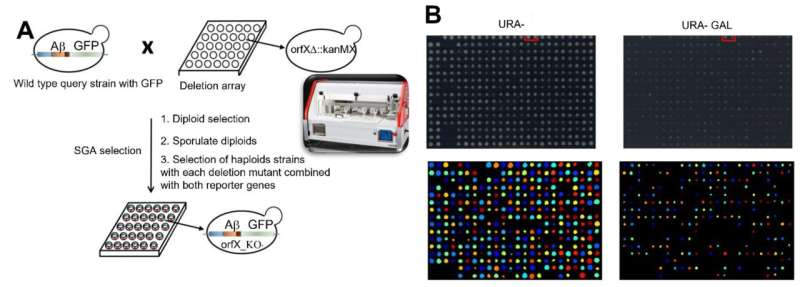This article has been reviewed according to Science X's editorial process and policies. Editors have highlighted the following attributes while ensuring the content's credibility:
fact-checked
proofread
Researchers identify new genes that modulate the toxicity of the protein β-amyloid, responsible for causing Alzheimer's

An international study led by the Molecular Physiology Laboratory at the UPF Department of Medicine and Life Sciences (MELIS) identifies new genes that modulate the toxicity of the protein β-amyloid, responsible for causing Alzheimer's disease.
Combining molecular biology, genomics and bioinformatics techniques, 238 amyloid toxicity protective or activator genes have been identified. Among them, the gene Surf4 stands out. It is involved in the control of intracellular calcium and, by increasing the toxicity of the β-amyloid protein, contributes to the disease.
Every year, 10 million new cases of dementia are diagnosed worldwide. Of these, 7 out of 10 are due to Alzheimer's disease. This disease develops with age, when the β-amyloid protein—a small protein secreted by neurons—begins to misfold and aggregate within the brain, having a neurotoxic effect. For the time being, there is no effective treatment to prevent β-amyloid protein aggregation and neurotoxicity.
In the study published in the International Journal of Molecular Sciences, researchers have identified, in yeast, 238 genes, similar to those of humans, that regulate Alzheimer's disease. Of these, 81 increase the toxicity of the β-amyloid protein and 157 are protective against this cellular toxicity.
A bioinformatic analysis has shown that most of the 238 genes identified are involved in mitochondrial activity, protein translation and intracellular calcium regulation. In this latter process, in which a large part of the identified genes are involved, the Surf4 gene stands out, whose protein regulates the entry of calcium inside the cell and has been shown to increase the toxicity of the β-amyloid protein, contributing to Alzheimer's disease.
According to the study coordinator, Francisco J. Muñoz, "calcium is one of the most important messengers that transfer information from the outside to within cells. It is involved in almost all cell functions. Hence, when the Surf4 protein is overexpressed, which decreases calcium entry and aborts the cellular processes dependent on it, neurons cannot function and they become very sensitive to amyloid toxicity."
The identification of SURF4 as an accelerator of β-amyloid protein toxicity damage opens the door to identifying new therapeutic targets that regulate amyloid toxicity in Alzheimer's disease.
To identify the genes that regulate Alzheimer's disease, a collection of 5,154 mutants of the yeast Saccharomyces cerevisiae—whose genome is greatly similar to the human genome—were analyzed and the expression of a gene was eliminated. Each of these mutants was crossed with other yeasts of the same strain that overexpress the human β-amyloid protein and the viability of these cells was analyzed over several days. In addition, a text mining analysis was performed to identify other genes related to the regulation of β-amyloid protein toxicity.
More information: Pol Picón-Pagès et al, A Genome-Wide Functional Screen Identifies Enhancer and Protective Genes for Amyloid Beta-Peptide Toxicity, International Journal of Molecular Sciences (2023). DOI: 10.3390/ijms24021278





















